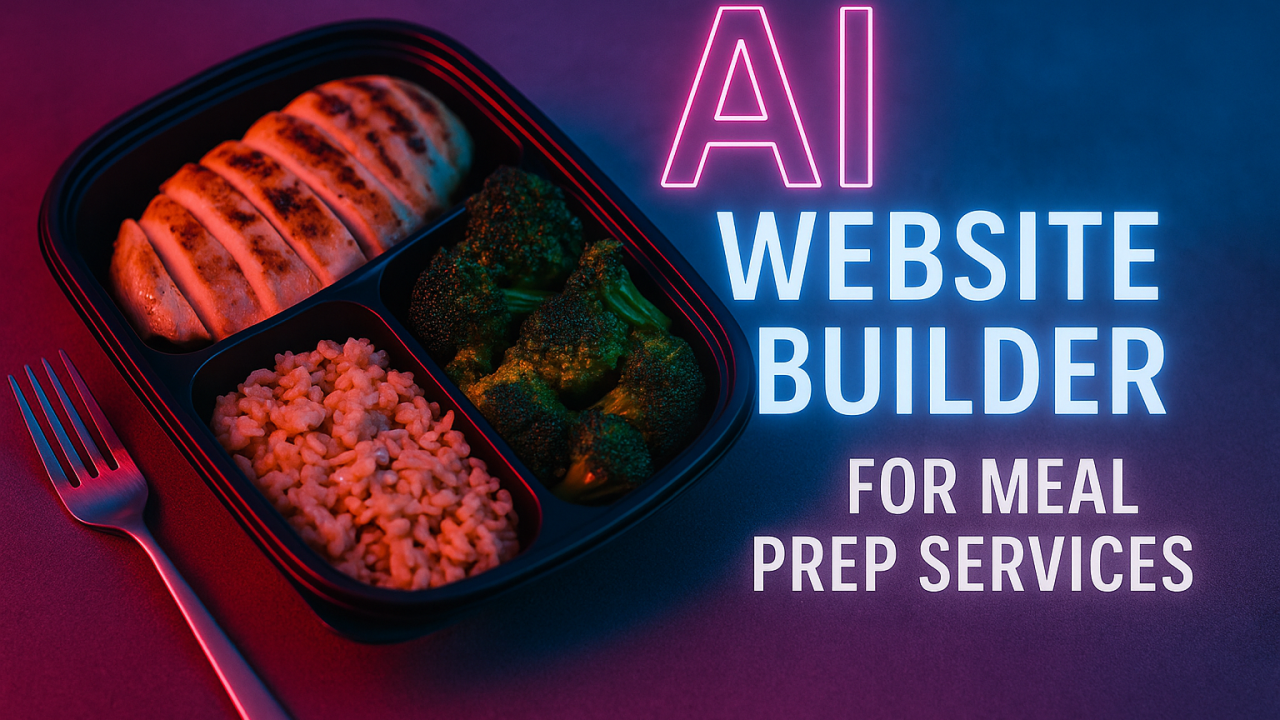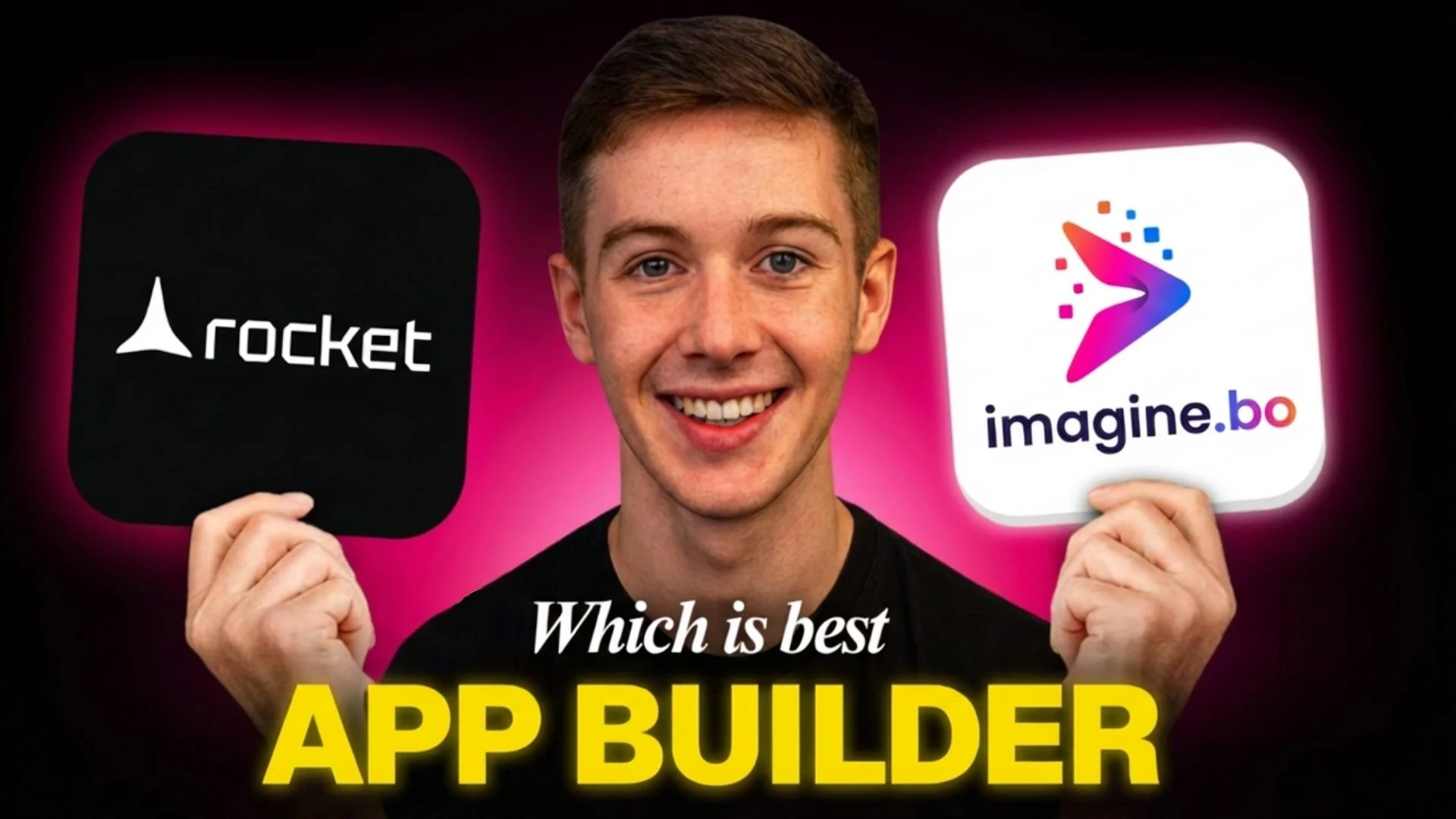
Meal prep services face unique challenges when it comes to building an online presence that clearly showcases menus, subscription options, and customer engagement. An AI website builder tailored specifically for these services helps create professional, customizable websites quickly and efficiently without requiring technical skills.
An AI website builder for meal prep services streamlines the process by offering easy-to-use tools that incorporate features like menu displays, client management, and customization to reflect the brand’s identity. This allows operators to focus on growing their business while ensuring their website meets both marketing and operational needs.
Launch Your App Today
Ready to launch? Skip the tech stress. Describe, Build, Launch in three simple steps.
BuildWith AI-driven platforms, meal prep companies can adapt their site design to match evolving offerings and customer demands in real-time, making it easier to stay competitive. This technology supports a seamless balance between functionality and user experience, essential for attracting and retaining clients in the food service industry.
Understanding AI Website Builders for Meal Prep Services
AI website builders provide tailored solutions that address the specific requirements of meal prep businesses. They offer features that streamline the design process, highlight menus, and facilitate customer management. These tools reflect current industry trends and support the operational needs of meal prep services.
How AI Simplifies Website Creation
AI website builders automate key aspects of web design. Using an AI-generated blueprint, they create layouts based on user input, such as describing the business idea or desired features. This reduces the need for technical skills and accelerates development.
Automation extends to content suggestions, image placement, and menu showcasing. AI adapts site structure to highlight subscription options, daily menus, or recipes, ensuring a user-friendly interface. This helps meal prep businesses launch websites quickly without sacrificing customization.
Integration capabilities allow for managing customer interactions, including orders and inquiries directly on the platform. AI streamlines updates, keeping sites relevant with minimal manual input.
Unique Needs of Meal Prep Businesses
Meal prep services need websites that cater to dynamic menu changes, subscription plans, and nutritional information. The site must clearly present meal options, ingredient details, and pricing in an organized manner.
Customers often look for customization based on dietary preferences or fitness goals. AI-driven builders enable easy updates of personalized meal plans and recipe content, reflecting customer demands.
Efficient integration with ordering systems and delivery tracking is critical. The website should support seamless communication and payment processes to improve customer experience and retention.
Trends in the Meal Prep Industry
The growing demand for personalized nutrition drives features like AI-generated meal plans and recipe recommendations. Websites now often include smart shopping lists and waste reduction tips.
Subscription models dominate, requiring websites to offer flexible meal delivery schedules and easy plan management. Mobile-first design is increasingly important for customer accessibility.
Sustainability is becoming a focus; websites highlight locally sourced ingredients and eco-friendly packaging. AI tools support these trends by enabling rapid content updates and data-driven marketing strategies to align with consumer values.
Core Features of AI Website Builders
AI website builders combine ease of use with advanced functionality to meet the specific needs of meal prep services. They enable professional-quality sites without coding, optimize user journeys based on data, and ensure strong security measures are in place.
No-Code Website Design
AI builders allow meal prep businesses to create websites without any coding knowledge. These platforms offer customizable templates designed specifically for food services, including menu showcases, subscription options, and order management features.
Users can drag and drop elements and adjust layouts to fit their brand. This zero-code approach saves time and money while delivering professional-grade quality. Mobile responsiveness is also integrated, ensuring the site looks and works well on phones and tablets.
SEO optimization tools are commonly built in, helping improve search rankings without extra effort. Integration with food delivery and payment systems further streamlines operations directly through the website.
Automated User Experience Optimization
AI continuously analyzes visitor behavior using embedded analytics dashboards. It identifies patterns such as popular menu items, peak browsing times, and conversion drop-off points.
Based on this data, the system suggests design tweaks and content updates to improve engagement and sales. For example, AI may recommend highlighting subscription plans more prominently or simplifying checkout steps.
Personalized experiences can also be created by adjusting site components according to user preferences or location. This automation reduces manual testing and helps maintain a site tuned to customer needs.
Security and Compliance Standards
Meal prep services often handle sensitive customer information, including payment details and dietary preferences. AI website builders enforce security checks adhering to standards like GDPR and SOC2 to protect this data.
Built-in features typically include SSL encryption, secure payment gateways, and regular vulnerability scans. Compliance tools assist in managing cookies, privacy policies, and consent banners to meet regional legal requirements.
These safeguards minimize risks such as data breaches or fines. They also build customer trust, which is critical for businesses that collect personal information through online orders and subscriptions.
Benefits of Using AI Website Builders for Meal Prep Startups
AI website builders provide meal prep startups with powerful tools to quickly launch a functional site, support growth demands, and access reliable assistance. These features reduce time, technical barriers, and costs while enabling operational efficiency and better customer engagement.
Rapid MVP Development
AI website builders enable startups to create a minimum viable product (MVP) fast by automating design and development tasks. Features like one-click build and AI-guided templates allow non-technical users to launch menus, subscription options, and ordering systems within days.
Customizable templates tailored for meal prep services streamline showcasing recipes and pricing without coding. This speed helps validate business ideas quickly and start acquiring customers.
Time saved on website setup lets startups focus on refining recipes and delivery logistics rather than technical details, improving early-stage efficiency.
Scalable Infrastructure for Growth
AI-built websites often include scalable infrastructure that adjusts to traffic increases and expanding service offerings. Meal prep startups can add new menus, customer management tools, and subscription tiers without rebuilding their site.
Cloud hosting and automated updates ensure uptime during peak ordering times. Integrated SEO features and mobile optimization support ongoing marketing efforts, helping startups grow their customer base reliably.
This flexibility minimizes technical bottlenecks as the business scales, making it easier to handle seasonal demand or geographic expansion with minimal additional investment.
Dedicated Support Systems
Most AI website builders offer expert support through AI assistants, live chat, or tutorials. This helps meal prep startups troubleshoot issues and optimize their site without needing in-house developers.
Access to expert guidance covers best practices for SEO, user experience, and e-commerce setup. Some platforms provide onboarding specialists familiar with food service requirements.
Reliable technical support reduces downtime and accelerates problem resolution, allowing startups to maintain smooth operations and focus on business growth instead of web maintenance.
Key Steps to Launching Your Meal Prep Website
Launching a meal prep website requires a clear presentation of the business idea, a detailed AI-assisted design plan, and effective deployment to a reliable hosting platform. Each phase demands careful attention to ensure the site attracts customers and operates smoothly.
Describing Your Business Concept
The first step is to define the meal prep service clearly. This includes outlining the types of meals offered, target customer demographics, and unique selling points like dietary options or locally sourced ingredients. Being specific about pricing, delivery areas, and subscription models helps set expectations early.
Crafting a concise mission statement and listing the key benefits on the homepage establishes trust. Clear navigation categories such as Menu, Pricing, How It Works, and Contact improve user experience. Visuals and branding should align with the intended market, emphasizing health, convenience, or flavor, depending on the concept.
Drafting Your AI-Powered Blueprint
Using AI website builders, the next step is creating an AI-generated blueprint tailored to meal prep businesses. This includes choosing templates optimized for food presentation and integrating customizable blocks for menus, customer testimonials, and ordering systems.
The AI tool assists in structuring content logically and ensuring mobile responsiveness. It can also recommend SEO keywords relevant to meal prep to improve search visibility. Users should focus on key components like clear call-to-action buttons for orders and subscription sign-ups, along with nutritional information sections.
Deploying and Managing Your Live App
Once the site blueprint is ready, deployment involves selecting a cloud provider such as AWS, Google Cloud Platform, or Vercel. These platforms offer scalability and security suited for handling online orders and customer data.
The deployment process typically includes connecting the site to a domain, setting up SSL for secure browsing, and configuring analytics tools. After launch, regular updates based on customer feedback and performance metrics maintain site relevance and functionality. Ongoing management ensures smooth order processing and fast load times.
Choosing the Right AI Website Builder Platform
Selecting an AI website builder for meal prep services involves balancing ease of use, customization, and features specific to food businesses. Key considerations include AI-driven design tools, SEO capabilities, content generation, and pricing transparency to ensure an efficient and cost-effective website launch.
Top AI Website Builders for Meal Prep
Not all AI builders offer features tailored to meal prep businesses. Platforms like imagine.bo focus on visually appealing templates optimized for showcasing food images and menus. They provide automation tools that highlight nutritional information and customer engagement options.
Other popular choices include Wix and Mixo, which offer drag-and-drop interfaces combined with AI to generate meal descriptions and optimize layout. Integration with social media and ordering platforms is also crucial, enabling direct client interaction and sales.
Key features to look for are responsive design, built-in SEO, and easy content updates. These factors improve user experience and help attract health-conscious consumers effectively.
Unique Advantages of imagine.bo
imagine.bo stands out by combining AI-driven website creation with specialized tools for food businesses. It uses intelligent content suggestions that improve menu presentation and nutritional details, which are important to meal prep clients.
The platform offers a private beta that grants early adopters access to exclusive features such as personalized branding and real-time AI guidance on text and visuals. This level of assistance reduces the time needed for site development.
Additionally, imagine.bo includes built-in SEO tools that guide users to optimize content for search engines without external apps. This integration makes ranking for food-related keywords more accessible and efficient.
Pricing and Plan Considerations
Understanding price structures is critical when selecting an AI website builder. imagine.bo provides clear pricing with tiered plans that scale based on features like bandwidth, custom domains, and e-commerce capabilities. This clarity helps avoid unexpected costs.
Most platforms offer a free trial or a limited free tier, ideal for testing the builder’s interface and features before committing. Subscription plans often include hosting and analytics, centralizing control within a single account.
Meal prep businesses should assess their expected site traffic and needed features, such as online ordering or subscription models, to choose a plan that fits both budget and growth goals without overspending.
Advanced Functionality for Meal Prep Websites
AI website builders for meal prep services offer tools that streamline order management, personalize customer choices, and improve delivery efficiency. These features enhance the user flow, optimize backend operations, and provide insightful data through analytics dashboards.
E-commerce Integrations
Seamless e-commerce integration is essential for meal prep websites. It enables secure payment processing, subscription management, and order tracking on a single platform. Most AI builders support multiple payment gateways like Stripe and PayPal, allowing flexibility for customers.
E-commerce features often include automated billing cycles for subscriptions and real-time inventory updates. Integration with analytics dashboards allows businesses to monitor sales trends, customer behavior, and revenue streams. This data supports informed decision-making and marketing strategies.
User flow is optimized by offering intuitive checkout processes, minimizing cart abandonment. Businesses can also set up promotional codes, upsells, and loyalty programs to increase customer retention and lifetime value.
Meal Customization Features
Personalization is critical in meal prep services to cater to dietary preferences, restrictions, and health goals. AI-powered website builders provide dynamic meal customization options, letting customers select ingredients, portion sizes, and meal frequency.
These features often include allergy filters and nutritional information displays. The meal builder adjusts recipes and pricing based on user selections, offering transparent, real-time updates. This reduces friction and increases customer satisfaction.
Customizable templates for menus and subscription plans enable quick edits and updates by the business owner. Integration with user data enhances the experience by remembering past orders and preferences, supporting an efficient, personalized user flow.
Automated Scheduling and Delivery
Automated scheduling tools manage recurring orders and delivery windows, improving logistics and customer convenience. AI systems can optimize delivery routes and times based on order location and kitchen capacity.
These tools integrate with calendar systems and notify customers of upcoming deliveries via email or SMS. Scheduling features help reduce late deliveries and minimize food waste by aligning production with demand forecasts.
Analytics dashboards track delivery performance metrics, such as on-time rates and customer feedback. This data helps businesses refine operational workflows, ensuring timely and consistent service while improving overall efficiency.
Scaling and Managing Multiple Meal Prep Projects
Efficiently handling several meal prep projects requires centralized tools to track progress, enable seamless teamwork, and maintain clear communication with clients. Founders and small agencies benefit most from structured workflows and technologies that support scalable growth without sacrificing control or quality.
Multi-Project Dashboard
A multi-project dashboard consolidates all active meal prep websites in one interface. It allows users to monitor status updates, deadlines, and content changes across clients simultaneously.
Dashboards often provide real-time analytics, showing visitor behavior and subscription trends per project. This helps identify which meal plans or menus need adjustment quickly.
Key features to look for include:
- Quick project switching without logging in and out
- Visual progress bars or task checklists
- Notification alerts for overdue tasks or client requests
This centralized overview reduces the risk of missing important updates when managing multiple clients and projects.
Team Collaboration Tools
Collaboration tools embedded within the website builder streamline communication among team members, including designers, nutrition coaches, and marketers. Features like shared calendars, task assignments, and comment threads ensure everyone stays aligned on project goals and deadlines.
Integration with popular apps such as Slack or Trello can further enhance workflow efficiency. Permissions can be set to control access levels, minimizing errors when updating menus or pricing.
For small agencies, these tools promote accountability and reduce bottlenecks by allowing transparent visibility of who is responsible for each deliverable within meal prep projects.
Client Management Workflows
Effective client management workflows in AI website builders help founders automate routine interactions. These workflows include onboarding forms, approval cycles for meal plan content, and subscription management systems.
Personalized client dashboards let customers review and approve menus, track deliveries, or modify subscriptions without direct contact, freeing up agency resources.
Automated reminders and real-time messaging reduce delays in feedback while keeping the client involved throughout the project lifecycle. These features support scalability by maintaining consistent communication standards across all meal prep clients.
Getting Started with imagine.bo for Meal Prep Services
Imagine.bo offers a no-code platform tailored for building apps quickly and efficiently. It requires joining a private beta, which includes managing a waitlist and inviting collaborators. These initial steps are essential for meal prep businesses aiming to leverage its AI-powered features.
Joining the Private Beta
To access imagine.bo, users must sign up for the private beta program. This grants early access to the platform before its public release. The private beta focuses on refining app-building tools suitable for non-technical founders and small teams.
Applicants provide basic information and a brief description of their meal prep service to ensure a good fit for the beta. Once accepted, users receive instructions to start building their custom website or app. Early participation often includes support and feedback opportunities to shape platform features.
How the Waitlist Works
If the private beta reaches capacity, new users are placed on a waitlist. The waitlist operates on a first-come, first-served basis but may prioritize applicants based on business potential or engagement level.
Users can monitor their position via email updates or the imagine.bo dashboard. Being on the waitlist guarantees eventual access as spots open from current users finishing their beta testing. The system ensures a controlled rollout to maintain platform stability.
Inviting Team Members
Within imagine.bo, users can invite team members to collaborate on app development. This feature supports meal prep businesses with multiple stakeholders, such as nutritionists, designers, or marketers.
Invitations are sent via email with secure access links. Team members gain roles with specific permissions, allowing them to edit content, manage subscriptions, or handle customer communication depending on their role. This collaboration fosters efficiency and centralizes project work.
Future Developments in AI for Meal Prep Websites
Advancements in AI technology are set to enhance meal prep websites by introducing smarter design tools and deeper personalization. These improvements promise to reshape how meal services engage customers and manage their operations, with significant effects on business strategies.
Upcoming Features in AI Builders
AI website builders will soon offer automated content generation, including menus, recipes, and promotional material tailored to diet trends and customer preferences. They will integrate AI-generated blueprints, providing ready-made site structures optimized for user experience and conversion rates.
More sophisticated customer interaction management tools will allow meal prep services to handle subscriptions, feedback, and personalized meal recommendations automatically. Features like real-time inventory syncing and AI-powered shopping list generators will help streamline backend operations.
AI will also enhance visual customization through automated style adjustments based on brand identity and market data. These features reduce setup time and allow small businesses to compete with larger meal prep companies more effectively.
Potential Impact on Business Models
AI-powered websites enable a shift toward more data-driven subscription models by offering personalized meal plans and dynamic pricing based on user behavior and preferences. This flexibility supports customer retention through continuous adaptation to dietary trends and lifestyle changes.
The integration of AI increases operational efficiency, lowering costs related to menu planning, marketing, and customer support. This efficiency may result in more competitive pricing and expanded service offerings.
Meal prep businesses can leverage AI to provide hyper-personalized experiences, potentially moving toward collaboration with nutritionists and health data services. This opens new revenue streams by targeting niche markets like medical diets or athletic performance nutrition.
Launch Your App Today
Ready to launch? Skip the tech stress. Describe, Build, Launch in three simple steps.
Build





